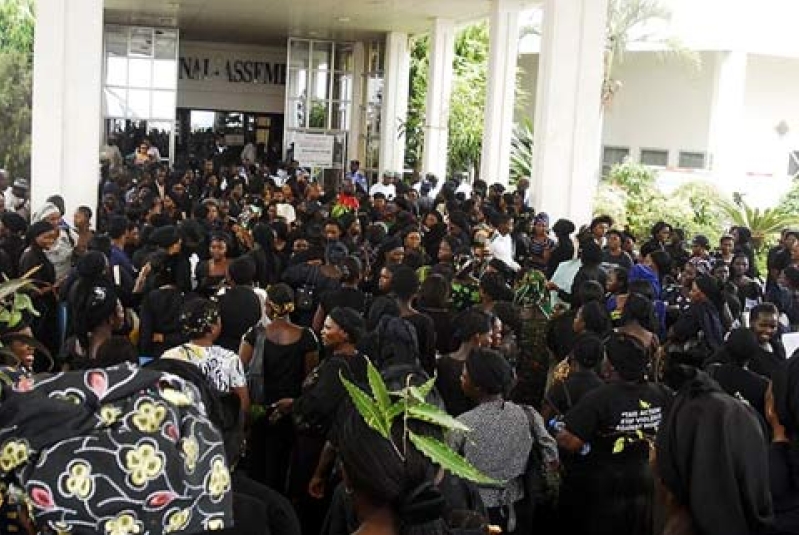
Thousands of Nigerian women dressed in black and carrying Bibles, wooden crosses, pictures of victims, and branches symbolizing peace marched in a central Nigerian state on Thursday to protest the massacre of about 500 villagers, who were mostly women and children.
The women, some with babies strapped on their back, walked from the headquarters of the Evangelical Church of West Africa in the city of Jos to the Plateau State House of Assembly calling for greater investigation into the mass murder of hundreds of people in two predominantly Christian villages near Jos.
“We are mourning because of the children that were killed on Sunday, we are coming as a mass to cry out,” said Rebecca Adiwu, according to Agence France-Presse.
Muslim cattle herders burned and cut up hundreds of villagers using machetes this past weekend.
Local experts say that the violence was caused by more than just religious differences. The Muslim and Christian villagers are from different tribes and they compete over resources, land and jobs in the poverty-stricken area, they said.
During the protest Thursday, women waved their Bibles and crosses in the air and chanted, “We do not want soldiers! No more soldiers!”
The Christian community in Plateau state is angry that the government and troops failed to step in to stop the massacre despite it lasting several hours. Several Christian leaders have publicly questioned why no security forces were present when there was suppose to be an enforced curfew in the area.
The women protesters called for the removal of Chief of Army Staff General Danbazzau and Major General Saleh Maina, the general officer commanding third Armoured brigade in Jos, “for failure to protect innocent citizens.”
Protesters also called for the release of youths who were unfairly detained in connection with the violence.
“If the federal government cannot stop the premeditated genocide and ensure peace in the state, then we will be compelled to go to the United Nations for intervention,” declared Zipporah Kpamor, secretary general of the Plateau State Women Development Association, according to Nigerian newspaper Daily Independent.
In addition to the Jos protest, a simultaneous march was held in the national capital, Abuja, where hundreds of women marched to the Federal House of Assembly to call for an end to the bloodshed.
Mervyn Thomas, chief executive of Christian Solidarity Worldwide, applauded the initiative taken by the women of Plateau state and urged political leaders to seriously consider the concerns outlined in the women’s communiqu.
“The reported army abuses in Plateau State, and its seeming failure to provide protection for vulnerable villagers, are undermining confidence in an important national institution,” Thomas said in a statement. “We also join the women of Plateau State in their call for the release of youths spuriously detained in connection with violence. Impunity will only end when the real organizers and perpetrators are apprehended and brought to justice.”
Likewise, Human Rights Watch Sub-Sahara Africa repertoire Sonya Maldar said the slaughter of villagers was nothing less than “ethnic cleansing.”
"It is our humble opinion that the perpetrators of this dastardly act are not faceless, and their sponsors can also be found and made to face the full wrath of the law," an HRW report stated.
"The recent killings are one too many, and we therefore call for immediate and decisive action on your part. There is a need for you to see this wanton destruction of lives as ethnic cleansing or genocide in its entire dimension and investigate the killings with such in mind."
Last weekend’s violence is the latest in a long history of sectarian violence in Jos. In January, a Muslim-Christian clash left hundreds dead. Some believe this past weekend’s violence is revenge for the January clash.
"Enough is enough, we are tired of this cycle of violence,” Esther Ebanga, a Christian pastor, told the protesters, according to AFP. “All we are asking is that our children and women should not be killed anymore. We demand justice."
Nigeria, the most populous country in Africa, is about evenly split between Muslims in the north and Christians in the south. More than 13,500 people have died in religious or ethnic clashes since the end of military rule in 1999, according to Human Rights Watch.







